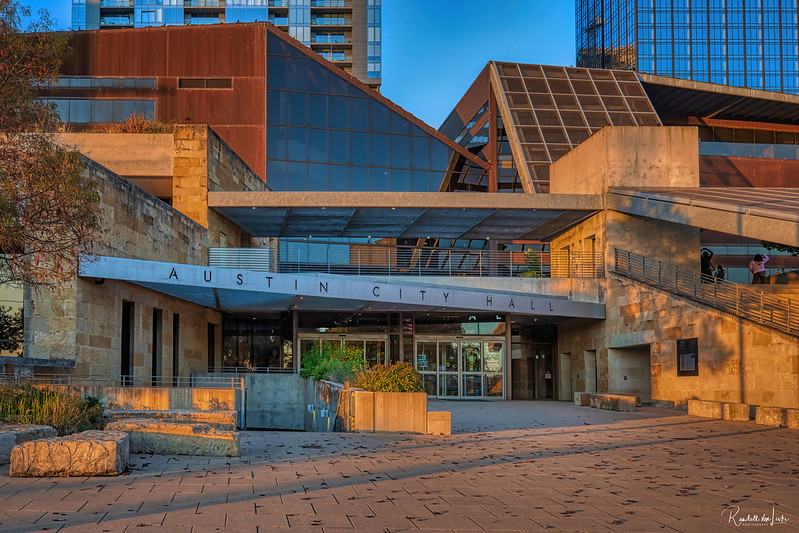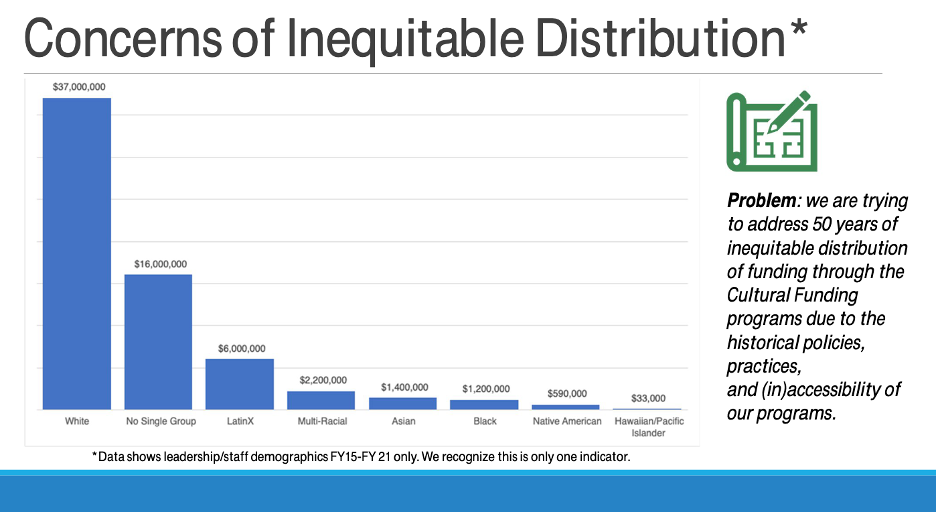Thrive and Elevate: Austin’s DEI Arts Funding and the Film Festivals it Supports
Hannah Wold / University of Texas at Austin

When Austin’s Cultural Arts division found evidence of sweeping racial inequity after a two-year study beginning in 2019, the division completely overhauled their arts granting program. Their 2021 announcement of a new DEI-aligned system was met with significant backlash, as longtime recipients of city grants decried reduced levels of funding.[1] Caught between their stated investment in diversity and an arts sector pushed to the brink by the pandemic, the division went back to the drawing board, producing the current iteration of the grants system in fall 2023. [2] Once again, several longtime recipients were shocked to receive comparatively small grants, while organizations that had been historically overlooked were funded at higher levels. The Tourism Commission publicly criticized the allocation, citing vague concerns about the artistic quality of the new grantees. Austin funds its arts grants using 15% of the city’s Hotel Occupancy Tax, and Chair Daniel Ronan wondered whether 2023’s allocation prioritizing historically marginalized organizations would attract tourists with the same success as legacy institutions.[3] As Austin’s Cultural Arts division navigated a circuitous route to restructure its granting priorities, Austin’s film nonprofits also had to keep up with the changes in order to continue to court a key source of funding.

Last year, while I was writing a thesis on the ways American film festivals have been impacted by the shift among grant makers towards DEI-aligned priorities, I looked at a lot of public and private US grants. Despite its challenges, Austin’s stands out to me as one of the most dedicated efforts at reshaping a grant system to address historical inequity.[4] Currently, they fund three grants; the Thrive grant at $80,000-$150,000, the Elevate grant at $10,000-$75,000, and the Nexus at $5,000. Each of these grants is clear that priority will be given to groups that are “at immediate risk of cultural erasure and displacement within Austin and/or have been institutionally marginalized and under-funded by the City of Austin Cultural Arts Division.”[5] The Elevate and Thrive grants are both scored on a rubric corresponding to specific valences of access, diversity, and inclusion.[6] Applications are evaluated in strictly kept ten-minute time slots by volunteer panelists from the public who can apply online.
Between the Thrive and Elevate grants, all of Austin’s nonprofit film festivals received funding from the City of Austin in 2023. To get a closer look, I’m focusing on 2023’s Elevate grant, which published its evaluation panels on the Department of Economic Development’s YouTube channel. The Austin Gay and Lesbian International Film Festival (aGLIFF), Austin Film Festival (AFF), Austin Jewish Film Festival (AJFF), and Deaf Film Festival (DFF) all applied in this grant cycle.[7] The panelists’ conversations about these festivals’ applications illustrate how both film festivals and their outside stakeholders define and resource Diversity-Equity-Inclusion. [8]
One of the primary elements that panelists highlighted for all applicants was the intersectionality of their programming; aGLIFF was praised for their clear service to the LGBTQ+ community but was critiqued for not providing more information on racialized diversity. One panelist noted a desire for more demographic data about attendees and leadership, and more information on ADA measures. Deaf Film Festival, by contrast, received unanimous praise for its “depth of engagement” with intersectionality and understanding of interconnected oppressions.[9] Austin Jewish Film Festival framed their DEI efforts as a mission to screen films about any community experiencing hate. The panel accepted this definition but noted that examples of specific film titles would have helped them understand the intersectionality of these efforts better.[10] Interestingly, Austin Film Festival was rated highly by panelists, although all demographics were reported as a single percentage of “Women or BIPOC.”[11] AFF noted that a majority of films and panelists (65% and 72%, respectively) identified as women or BIPOC[12], but this framing struck me as diffuse; combining gendered demographics with racial ones obscures the festival’s investment in programming, partnership, and outreach unique to the array of identities contained within this moniker.
Another definition of marginalization presented itself when panelists expressed surprise that aGLIFF has been run entirely by volunteers for 37 years and praised the organization for its dedication. The panelists went on to highlight a note contextualizing the deficit shown in the organization’s operating budget. In the resulting conversation on fiscal sustainability, the panel moderator commented that, although the City of Austin “does not provide funding on need” and the organization’s financial health is not considered in scoring, this reality could speak to a lack of access experienced in years past.[13] She emphasized that “folks who are applying for these funds are folks who are at risk of cultural erasure but also may have had minimal access … to funding and so, yes, 37 years of being all-volunteer and talking about their financial situation” served as one potential marker of cultural erasure.[14]
Finally, the relationship of the Deaf Film Festival to Austin’s perceived cultural capital became a key point for one panelist, despite the fact that this measure was not on the rubric. Having done some research on the topic, he observed that the festival has “a real opportunity to be in a leadership role and be the Deaf Film Festival out there and again have Austin be a premiere film festival city … If you do your situational analysis out there in the country – Deaf film festivals – they’re not there.”[15] The festival’s ability to boost Austin’s reputation can’t be discretely scored, but the panelist was nevertheless “really excited it was here in Austin – it could really put a foothold in that regard.”[16] It’s also worth noting that the applicant’s ability to attract national attention is directly connected to the availability of future arts funding in Austin; if a film festival draws tourists, the Hotel Occupancy Tax from which arts funding is drawn will increase.

Thus, although evaluations of an applicant’s ability to discursively frame their investment in DEI was structured by a rubric, a time-keeper, and a numerical ranking system, the panelists’ discussions were nevertheless elastic enough to encompass a wide range of information unique to the film festival’s situation. Ultimately, all festivals that applied received funding; Austin Film Festival and Austin Jewish Film Festival were funded at $30,000, and Deaf Film Festival and Austin Gay and Lesbian International Film Festival each received $50,000. Although I have no way of knowing the exact scoring that produced these results, it’s worth highlighting that both aGLIFF and Deaf Film Festival received higher funding levels. They were also the only evaluations in which a panelist argued that elements outside the scoring system demonstrated the strength of the applicant’s claim to funding, suggesting that results are shaped by the investments, priorities, and definitions of diversity held by both festivals and panelists.
As I sifted through evidence of the herculean effort put forward by the Cultural Division to reckon with both a history of inequity and the resulting cycle of backlash to the overhaul, I couldn’t help but wonder how long this new system will last. Although SB-17 (Texas’s Anti-DEI law) targets secondary education, its legal claim is predicated on the allocation of state funding. As it is public money that fuels Austin’s arts grants, I wonder if there is a ticking clock on the era in which the Cultural Division can publicly claim affinity for DEI. Indeed, I think time is already running out; the Nexus Grant, mentioned above as the smallest arts grant distributed by the city, uploaded revised guidelines with several notable changes. For example, the 2023 application asks “how funding will directly support the diversity and equity of the City’s cultural community.”[17] In 2024, the question has been revised to ask applicants to “describe how you will market your proposed activities.”[18] Idiosyncratic though the City’s arts granting may be, it has fostered wonderful new voices in Austin’s film festival landscape. It has weathered five years of backlash already, and only time will tell if it can survive the scrutiny of state-level legislation.
Image Credits:- Austin City Hall, the home base of several projects supported by the Austin Cultural Arts Division. Photo by Randy von Liski, CC BY-NC-ND 2.0.
- A screenshot from a May 2022 presentation given by Austin’s Cultural Arts Division Manager Meghan Wells to Austin City Council, illustrating historical inequity (author’s screenshot).
- A red carpet photo from Austin’s 2023 Deaf Film Festival.
- Chad Swiatecki, “Cultural Arts Continues Revisions for Arts Contracts Funded by Hotel Tax.” Austin Monitor, June 2, 2022. https://www.austinmonitor.com/stories/2022/06/cultural-arts-continues-revisions-for-arts-contracts-funded-by-hotel-tax/ [↩]
- Ben Thompson. “Austin Presses Pause on Arts Funding Changes Amid Debate.” Community Impact, October 12, 2021. https://communityimpact.com/austin/central-austin/arts-entertainment/2021/10/12/austin-presses-pause-on-arts-funding-changes-amid-debate/. [↩]
- Chad Swiatecki, “Tourism Commission Wants More Transparency on Hotel Tax Funding Decisions for Arts Groups.” Austin Monitor, October 24, 2023. https://www.austinmonitor.com/stories/2023/10/tourism-commission-wants-more-transparency-on-hotel-tax-funding-decisions-for-arts-groups/ [↩]
- “Cultural Arts Funding Review Process Update.” Economic Development Department, May 25, 2022. https://services.austintexas.gov/edims/document.cfm?id=383891 [↩]
- “Elevate Grant Guidelines,” Elevate, May 2, 2024, https://www.austintexas.gov/sites/default/files/files/EDD/CulturalArts/Elevate_HOT/ElevateGrant_Guidelines.pdf. [↩]
- The 2023 Elevate grant’s rubric, for example, can be found here on pages 7-11. [↩]
- Other non-festival film and media organizations in Austin applied and were funded in 2023’s Elevate cycle as well, including the Austin Film Society, Hyperreal Film Club, and We Luv Video. For clarity, I’m only focusing on organizations that are structured as film festivals, although future research on other types of film nonprofits and their funding structures could be fascinating. [↩]
- “Other review panels covered organizations key to Austin’s media culture landscape but that aren’t classified as film festivals, including Panel 1 Day 1, Panel 2 Day 1, and Panel 3 Day .” [↩]
- “Elevate Grant Organization Panel 3 Day 1 (August 28, 2023),” YouTube, September 1, 2023, 2:09:04-2:09:53. https://www.youtube.com/watch?v=qkYYWRev2_8. [↩]
- “Elevate Grant Organization Panel 2 Day 2 (August 26, 2023),” YouTube, September 7, 2023, 2:06:47-2:07:26. https://www.youtube.com/watch?v=r9fYLdMjrTA [↩]
- “Elevate Grant Organization Panel 1 Day 2 (August 24, 2023).” YouTube. September 1, 2023, 3:54:25-3:55:11. https://www.youtube.com/watch?v=vvlWKMayZ3M. [↩]
- It’s hard to gather demographic data on the percent of audience and staff that identify as LGBTQ+ without being overly invasive, so it’s not surprising that that identity marker isn’t included here. [↩]
- “Elevate Grant Organization Panel 1 Day 2 (August 24, 2023).” YouTube. September 1, 2023, 50:20-50:40. https://www.youtube.com/watch?v=vvlWKMayZ3M. [↩]
- “Elevate Grant Organization Panel 1 Day 2 (August 24, 2023).” YouTube. September 1, 2023, 49:51-50:15. https://www.youtube.com/watch?v=vvlWKMayZ3M. [↩]
- “Elevate Grant Organization Panel 3 Day 1 (August 28, 2023),” YouTube, September 1, 2023, 2:08:10-2:08:40. https://www.youtube.com/watch?v=qkYYWRev2_8 [↩]
- “Elevate Grant Organization Panel 3 Day 1 (August 28, 2023),” YouTube, September 1, 2023, 2:08:45-2:08:52. https://www.youtube.com/watch?v=qkYYWRev2_8 [↩]
- “Nexus Pilot Year Guidelines,” Nexus, September 24, 2023. https://www.austintexas.gov/sites/default/files/files/EDD/CulturalArts/Nexus_HOT/Nexus%20Guidelines_English.pdf [↩]
- “Nexus Pilot Year Guidelines,” Nexus, March 20, 2024, https://www.austintexas.gov/nexus. [↩]